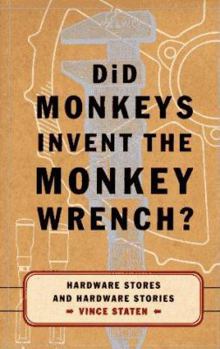Did Monkeys Invent the Monkey Wrench?: Hardware Stores and Hardware Stories
Select Format
Select Condition 
Book Overview
A historical and anecdotal tour of an American institution turns up details about the origins of common tools and gadgets, their past and present uses, and stories connected with them. This description may be from another edition of this product.
Format:Hardcover
Language:English
ISBN:0684801329
ISBN13:9780684801322
Release Date:June 1996
Publisher:Simon & Schuster
Length:234 Pages
Weight:0.97 lbs.
Dimensions:1.1" x 6.0" x 8.8"
Customer Reviews
3 ratings
Exceeds Expectations
Published by Thriftbooks.com User , 21 years ago
This book is wonderful, especially if you love hardware stores, tools, and doing stuff and always wondered why a cotter pin is called that. Humor, pathos, plenty of it, no photos, but who needs a photo of a ten-penny nail? Plenty of books tell you what to buy, but few tell you who were Black and Decker and why tools and gadgets are so important to the world. Etymologists should buy this book as well, a true nuts-and-bolts effort. Great timewaster. More, please. My dad loved tools and would have devoured this book.
A Throne Delight
Published by Thriftbooks.com User , 24 years ago
Books like this are meant to be read over a period of three-four weeks. There is a proper room in the house where a man can read and enjoy such a book. Staten's history of tools, worked in with tidbits from his days of being in his father's hardware store, especially when it came to describing the characters who worked there, and some of the customers, will delight every handyman who ever got his hands dirty. The fourth member of my family is now reading it.
A fun romp through the hardware store
Published by Thriftbooks.com User , 24 years ago
As fewer and fewer of us actually touch anything other than a keyboard in our work, there is a growing fascination with the real stuff of the wrkaday world- the nuts and bolts and tool of those who do what some like to call "real" work. Men in particular seem to be fascinated with the materials and tools of work they once disdained. Perhaps it's something genetic. The last few years has seen an explosion, it seems, in books that try to tell us about these objects that were once part of everyday experience. Robert Pirsig tapped into something when he wrote "Zen and the Art of Motorcycle Maintenance". (Beyond stealing the title from Herrigel's "Zen and the Art of Archery", that is). There are books about the Zen of timber framing, the spiritual aspects of homebuiilding, and for all I know, personal growth acheived through snaking out clogged plumbing.Among these books is a sub-genre that's just about the pure pleasure of stuff. (There is, in fact, a book called "Stuff" that's quite good.) Forget accomplishing something; there's a great deal of enjoyment to be had in just handling tools, hardware and lumber, and that's what Staten's book is about.Staten grew up in a hardware store and has the easy familiarity with the materials that fill the shleves and bins. He has stories to tell about the store, the people who work there and the people who shop there, and woven through the book is the story of the rise and eventual decline of the neighborhood hardware store- and his father's store. Mst of the book is roughly organized into departments, so you wander from Tools to Paint to Lawn and Garden and so forth. Within each department you work your way down the aisles, encountering items: 12 inch GE Fluorescent Bulb: $2.98. Stanley Coping Saw: $12.98. Each item listing is followed by a short essay- anywhere from a paragraph to a few pages- with perhaps some history of the object, a discussion of why one might choose one material over another or some other bit of fascinating trivia. Most of it is very good, but I did spot quite a few errors; for example, Edison's incandescent bulb was not invented to be the closest thing to daylight, flint sandpaper doesn't wear by losing large pieces of grit (they fracture, which is actually useful in some ways), it is most certainly not true that "no one knows [how superglue works]", and the "d" used to designate nail sizes didn't mean "pound" in England; it meant, and still means "penny", coming from the Latin "denir", a small coin. And if you think, as Staten writes, that a weed eater won't cut your hand or foot, you're in for a rough surprise. Of course, this is a book for casual reading and not a reference book, so that's not a fatal flaw, but I still would have liked to see a little better error checking.There's one other thing that annoys me about the book. When he's in the midst of a long discourse about the history of a shovel, or the salemen who worked in his father's stor





